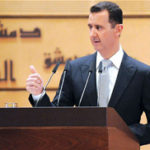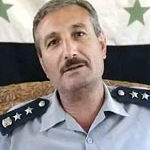Syrian Rebel Chief Asks World to Stop Bloodshed
Daily News Article — Posted on January 18, 2012
 NOTE: The Arab League is a regional organization of Arab states in North and Northeast Africa, and Southwest Asia (Middle East). It was formed in Cairo in 1945 with six members: Egypt, Iraq, Transjordan (renamed Jordan in 1949), Lebanon, Saudi Arabia, and Syria. Yemen joined as a member in May 1945. The Arab League currently has 22 members (including one, Syria, whose participation was suspended in November 2011) and four observers. The main goal of the league is to “draw closer the relations between member States and co-ordinate collaboration between them, to safeguard their independence and sovereignty, and to consider in a general way the affairs and interests of the Arab countries.”
NOTE: The Arab League is a regional organization of Arab states in North and Northeast Africa, and Southwest Asia (Middle East). It was formed in Cairo in 1945 with six members: Egypt, Iraq, Transjordan (renamed Jordan in 1949), Lebanon, Saudi Arabia, and Syria. Yemen joined as a member in May 1945. The Arab League currently has 22 members (including one, Syria, whose participation was suspended in November 2011) and four observers. The main goal of the league is to “draw closer the relations between member States and co-ordinate collaboration between them, to safeguard their independence and sovereignty, and to consider in a general way the affairs and interests of the Arab countries.”
(by Erika Solomon, ChicagoTribune.com) BEIRUT (Reuters) – A Syrian rebel army chief urged the world on Tuesday to protect civilians in Syria, saying Arab peace monitors had failed to curb President Bashar al-Assad‘s violent response to a 10-month-old revolt against his rule. [Bashar’s father Hafez al-Assad ruled Syria for 29 years until his death in 2000. Al-Assad was elected in 2000, re-elected in 2007, unopposed each time.] [The Arab League] has also proved unable to stop the bloodshed in Syria, where U.N. officials say more than 5,000 people have been killed and Damascus says [2,000 of] its security forces have [been killed].
Riad al-Asaad, Turkish-based commander of the rebel Free Syrian Army (FSA), called for international intervention to replace the Arab observer mission, [whose mandate expires on January 19th].
“The Arab League and their monitors failed in their mission and though we respect and appreciate our Arab brothers for their efforts, we think they are incapable of improving conditions in Syria or resisting this regime,” he told Reuters by telephone.
“For that reason we call on them to turn the issue over to the U.N. Security Council and we ask that the international community intervene because they are more capable of protecting Syrians at this stage than our Arab brothers,” Asaad said.
Iran condemned what it called foreign interference in the affairs of its closest Arab ally, Syria, and praised reforms President Assad has promised as “problem-solving.”
“We are fundamentally against interfering in the affairs of other countries. We think it does not solve the problems but will only make them more complicated,” [Iranian] Foreign Ministry spokesman Ramin Mehmanparast told a news conference.
Assad, while [offering] reform, has vowed to crush his opponents with an “iron fist,” but Syrians braving bullets and torture chambers appear equally determined to add him to the list of the past year’s toppled Arab leaders.
Army deserters and other rebels have taken up arms against security forces dominated by Assad’s minority Alawite sect, pushing Sunni Muslim-majority Syria closer to civil war.
……………………..
The Arab League must decide soon whether to withdraw its 165 monitors, whose mandate expires on Thursday, or keep them in Syria even though they are set to report that Damascus has not fully implemented a peace plan agreed to on November 2.
The Arab plan required Syria to halt the bloodshed, withdraw troops from cities, free detainees, provide access for the monitors and the media and open talks with opposition forces.
[The Arab League chief, Nabil Elaraby, told The Associated Press that Assad’s regime was either not complying or only partially complying with a league plan that Syria signed last month to end its crackdown. “We are very concerned, because there were certain commitments that were not complied with,” he said in Cairo, where the league is based. “If this continues, it may turn into civil war.”]Qatar has proposed sending in Arab troops, a bold idea for the often sluggish League and one likely to be resisted by Arab rulers close to Assad and those worried about unrest at home.
Syria’s foreign ministry said on Tuesday it was “astonished” at Qatar’s suggestion, which it “absolutely rejected.”
The Arab League could ask the U.N. Security Council to act, but until now opposition from Russia and China has prevented the world body from even criticizing Syria, an old ally of Moscow.
Western diplomats said a Russian draft resolution handed to the council on Monday did not make clear if Moscow would accept tough language demanded by the West.
Few Western powers favor any Libya-style military action in Syria, which lies in the heart of the conflict-prone Middle East. Bordering Lebanon, Turkey, Jordan, Iraq and Israel, it is allied to Iran and the Lebanese Shi’ite [terrorist group] Hezbollah.
The United States, the European Union, Turkey and the Arab League have announced sanctions against Syria, but while these have hurt its economy, they have yet to prompt Assad to change course. Opposition to sanctions from some of Syria’s trading partners, notably Lebanon and Iraq, also dilutes their impact.
[U.N. Security] Council members have been divided for months over the uprising against Assad, with Western countries pushing for strong condemnation of the government’s bloody crackdown but Russia seeking to shield its ally Damascus.In October, Russia and China vetoed a European-drafted resolution that threatened possible sanctions. Russia presented its own draft on December 15 and Western countries agreed to discuss and negotiate it, but there has been little progress since then.
A Syrian lawmaker told Reuters on Monday he had fled the country to join the opposition after losing hope that Assad would enact reforms or stop the violence.
“Blood is in the streets,” said Imad Ghalioun, from the restive city of Homs, who took refuge in Cairo two weeks ago.
“The whole country is bleeding. I do not think there will be any reforms because the young people have taken their decision,” he said. “This is a revolution and there is no going back.”
(Additional reporting by Khaled Yacoub Oweis in Amman and Mariam Karouny and Dominic Evans in Beirut; Writing by Alistair Lyon; Editing by Alastair Macdonald)
Reuters. Reprinted here for educational purposes only. May not be reproduced on other websites without permission from The Chicago Tribune. Visit the website at ChicagoTribune.com.
Questions
Note to Students: There is a lot of information here. Don't get discouraged! To help you understand more about what is happening in Syria, read information under the "Background" below BEFORE answering the questions.
1. Identify the following people mentioned in the article:
a) Bashar al-Assad
b) Riad al-Asaad
c) Nabil Elaraby
2. a) What is the Arab League?
b) What is the Free Syrian Army?
3. a) What has Riad al-Asaad said about the Arab Leagues's mission in Syria?
b) What has Mr. al-Asaad called on the Arab League and the United Nations/international community to do?
4. What requirements did the Syrian government fail to fulfill under the Arab League's peace plan it had agreed to in November 2011?
5. a) How involved do you think the international community should be in protecting the citizens of Syria from their president and his army?
b) How involved do you think the United States should be in protecting the citizens of Syria from their president and his army?
Background
The Free Syrian Army (FSA) is the main opposition army group in Syria:
- It is composed of defected Syrian Armed Forces personnel, who have been active during the Syrian Uprising.
- The formation of the opposition army group was announced on July 29, 2011 in a web video released by a group of uniformed defectors from the Syrian military, who called upon members of the army to defect and join them.
- Riad Mousa al-Asaad is the commander of the Free Syrian Army. He is a former Colonel in the Syrian Air Force who defected in July 2011.
- Colonel Asaad announced that the Free Syrian Army would work with demonstrators to bring down the system and declared that all security forces attacking civilians are justified targets.
- He has also stated that the Free Syrian Army has no political goals except the liberation of Syria from Bashar Assad's government.
- The FSA has also stated that the conflict is not sectarian, and that they have in their ranks Alawis who oppose the government, and that there will be no reprisals when it falls.
- In December 2011, the Free Syrian Army reported a total of 20,000 men in its ranks. The actual number of soldiers defecting to the Free Syrian Army is unknown. (from wikipedia)
The 2011–2012 Syrian uprising is an ongoing internal conflict in Syria.
- Public demonstrations first took place on January 26, 2011, but were only a sporadic occurrence until mass protests erupted in Daraa on March 15th.
- The situation quickly developed into a full-scale nationwide uprising, with protesters demanding the resignation of President Bashar al-Assad and the overthrow of the government.
- The situation in Syria is part of the Arab Spring, a wave of social upheaval throughout the Arab World demanding greater political freedom and an end to autocracy.
- Inspired by the successful revolutions in Tunisia and Egypt, Syrian protesters have [implemented] ... a sustained campaign of civil resistance aimed at ending nearly five decades of Ba’athist rule.
- As protests continued, the Syrian government began deploying tanks and snipers as a means to quell the uprising.
- Water and electricity have been shut off in particularly restive areas, and security forces have resorted to confiscating flour and food.
- The Syrian Army has besieged [many cities where large numbers of protesters live].
- According to witness accounts, soldiers who have refused to open fire against civilians were summarily executed by the Syrian Army.
- The Syrian government denied the reports of defections and blamed "armed gangs" for causing trouble.
- Since summer 2011, opposition militants and primarily defectors formed fighting units, which began an insurgency campaign against the Syrian regular army.
- As a result violent clashes began across the country, increasing by the end of the year and the insurgents unified under the banner of the Free Syrian Army, showing an increasingly organized fighting patterns.
- According to the UN, since the beginning of the uprising, more than 5,000 people, primarily protesters, have been killed in total, many more injured, and thousands of protesters have been imprisoned.
- Over 300 children have been killed by security forces as well.
- Additionally, over 600 detainees and political prisoners have died under torture. (from wikipedia)



